But after the rampant political corruption and infamous "boom boom" era of Berlusconi came to a close, and regional support for the arts growing, it seems Italian cinema is finally finding its footing again. And with the international success of Mateo Garrone's Gomorrah and Reality and Paolo Sorrentino's The Great Beauty winning the Best Foreign Language Oscar last year, we are indeed witnessing the resurgence of Italian cinema.
For this year's New Italian Cinema series, Film Society of Lincoln Center presents exceptionally strong and diverse edition which includes the latest work from established veterans (Gianni Amelio, Roberto Andò, Daniele Luchetti) and top award winners, alongside promising new talents from both the commercial and independent spheres, with in-person appearances at many screenings. The series runs June 5 - 12. For more tickets and more info, please visit FSLC website.
I am very happy to get the first dibs on these five diverse films for the festival:
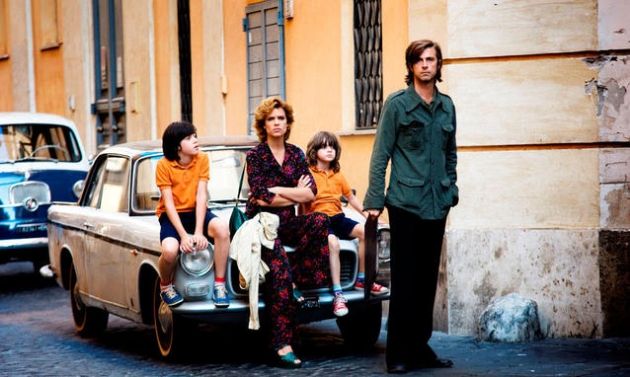
Those Happy Years (dir. Daniele Luchetti) *Opening Night Film
Daniele Luchetti (My Brother is an Only Child, La Nostra Vita), one of the staple names in current Italian cinema, presents a deeply affecting family drama based on his childhood- growing up in socially tumultuous 70's Italy.
Told in grown up Dario (Samuel Garofalo)'s voice, the film chronicles ups and downs of a couple- Guido (Kim Rossi Stuart), a conceptual artist and his slowly blossoming wife Serena (Micaela Ramazzoti) and their two young sons. A son of an artist and an overly critical mother, Guido is swept up in 'being an artist', surrounded by naked models and dreaming of that big break. He and jealous Serena always fight about his infidelity in front of kids. She doesn't understand why she and kids can't visit him at the studio and he protests that as an artist he needs space.
The big break comes along and Guido has a naked body painting performance in Milan. Serena shows up with kids and Guido barks at her. She then takes off with her friend Helke (Martina Gedeck) to France in a feminist retreat with kids in tow. For many Italian women, it's the time of self-realization and free love. She hooks up with Helke and everything is being documented by Dario, the budding filmmaker with his super-8 camera. In the meantime, Guido's Milan show flops.
Those Happy Years is a delicate, detailed period piece that's intimate and inviting with affecting performances by everyone involved. It might be reflecting specific time and place, but also shows struggles of being an artist and the process of creating something worthwhile which often is linked to life experiences.
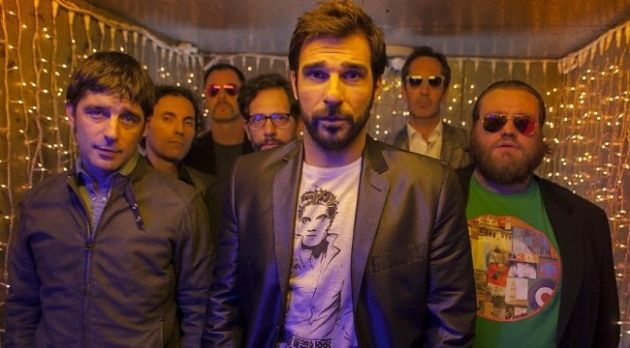
I Can Quit Whenever I Want (dir. Sydney Sibilia)
Pietro (Edoardo Leo), a 30 something, financially struggling biochemistry professor, loses his contract with the school. There is no funding for his algorithm research. Even with his tutoring jobs, he and his social worker girlfriend are not making ends meet. Then after tracking one of his student who owes him tutoring money into a night club and unintentionally taking drugs, Pietro realizes that he can make quality grade 'smart drugs' - made from yet to be illegal substances in Italy and sell them. All he needs is assembling a willing and able crew from his down and out middle-aged academic friends doing menial jobs to survive - a fellow biologist working as a dishwasher at a Chinese restaurant, microeconomist as a carny, archeologist as a construction worker, anthropologist as a junkyard worker and a couple of Latin scholars as night gas station attendents. Hilarity ensues.
This satiric take on Italy's economical downturn and joblessness among the over-educated, under-employed generation is a slick, funny entertainment and destined for a Hollywood remake. I can totally see the remake starring Paul Rudd, Adam Scott and Zach Galifianakis.
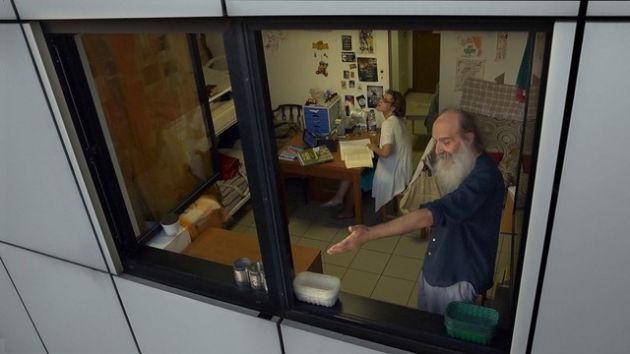
Sacro GRA (dir. Gianfranco Rossi)
I love this region specific observational documentary. The film depicts the lives of those who live around the Sacro GRA (Grande Raccordo Anulare), the ring highway system that surrounds Rome. It has no narration or a specific destination. We move from person to person as they go on their lives. We observe them in their most natural states in their homes and jobs- an EMT worker, as he drives along the highway saving lives, a beetle expert listening to the inside of palm trees with a stick-in microphone, an old fisherman who catches eels in the river Tiber with his stoic Lithuanian wife, an aging actor who stars in 'still photo novelas', people who live in their cars, bar floozies, prostitutes.... Then we get to observe people living in a ultra modern, highrise apartment, conversing with each other about life's incongruities and sweet nothings through the lens of the camera rigged just outside the window, looking in.
The whole film feels like the real life 'Wings of Desire' where the audience take on the roles of the heavenly creatures listening in. Shot in two year span in different seasons, Sacro GRA is a beautiful observation of human life that is gentle and thoroughly engaging. *Winner of the Golden Lion at Venice Film Festival (the first documentary to win the top prize in the fest history).
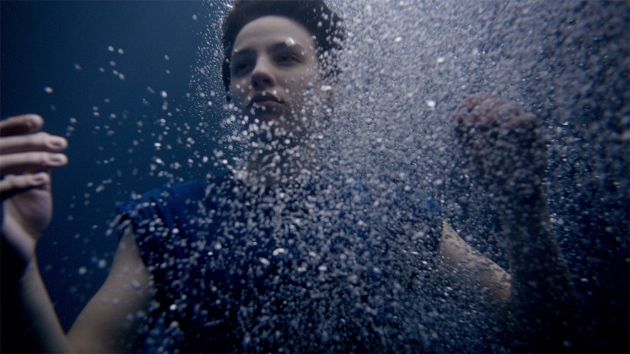
South is Nothing (dir. Fabio Mollo)
Organized crime still has a tight grip on many communities in southern Italy. South is Nothing, a brooding drama reflects the dark shadow it casts in the lives of people who live there. Grazia (Miriam Karlvist) is a highschool tomboy living in a such southern Italian port town. She helps out her tight lipped father at his fish store. Her family is broken after the disappearance of her older brother. Her father doesn't answer any of Grazia's inquiries about her brother. What is not spoken can't hurt you, so the saying goes.
Meanwhile, Grazia sees her brother's ghost when she swims in the ocean, as if in a dream, trying to tell her something. Convinced that her brother's alive, she looks for him with the help of a transient fellow student who takes an interest in her.
Mollo gracefully makes a point of the pressure these people live under without overstating any real physical presence. It's the crushing silences and whispers among the inhabitants that speaks volumes. The fear and frustration is ingrained in their faces. You either give in to the mafia and move up north, or you perish.
Karlvist is remarkable here as short haired, flat-chested Grazia, grappling with an unimaginable loss. Was she always a tomboy? Or is it her over protective brother's absence made her that way? South is Nothing also works as a great character study and cinematically exemplary film in current crop of Italian cinema.
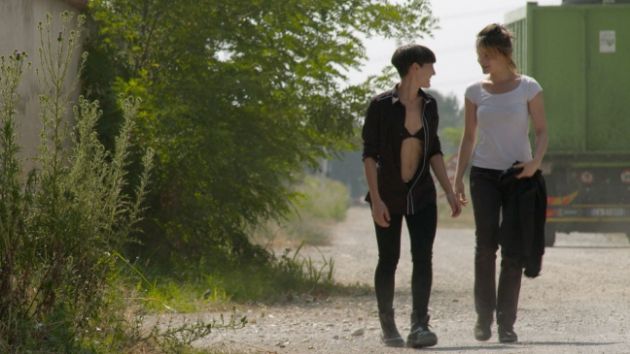
Small Homeland (dir. Alessandro Rossetto)
Documentary filmmaker Alessandro Rossetto's narrative debut, Small Homeland is a sprawling observation of rural Italy's working class town with the regionalist/nationalist movement simmering in the background. It starts out with a sweeping aerial shot of rural landscape that ends on a black monolith which is a chintzy hotel. The film takes some time to introduce all the characters and settle on the meat of the narrative, concerning two young rebelious women, Luisa (Anna Carnielo) and Renata (Roberta Da Soller) doing menial jobs as maids at the hotel surrounded by cow heaps and horse stables. Luisa and Renata dream of getting the hell outta town. For money and subsequent blackmailing, the duo and Luisa's good natured Albanian lover Bilal (Vladimir Doda) also perform private sex shows for a local sleazeball Rino (Diego Ribon), who happens to be a friend of Luisa's gun totting, xenophobic father, Franco (Mirko Artuso).
Under Rino's leadership, the local hicks are riled up over swelling numbers of immigrants in Veneto region, scarcity of jobs, violent crimes and constant fear mongering media featuring picture of Osama Bin Laden.
With three people credited as writers, Small Homeland loses focus a bit. The slow build up of simmering tension leads to inevitable melodrama at the end. Still, the film is an absorbing reflection of current Italian society going through sociopolitical turmoil.
No comments:
Post a Comment